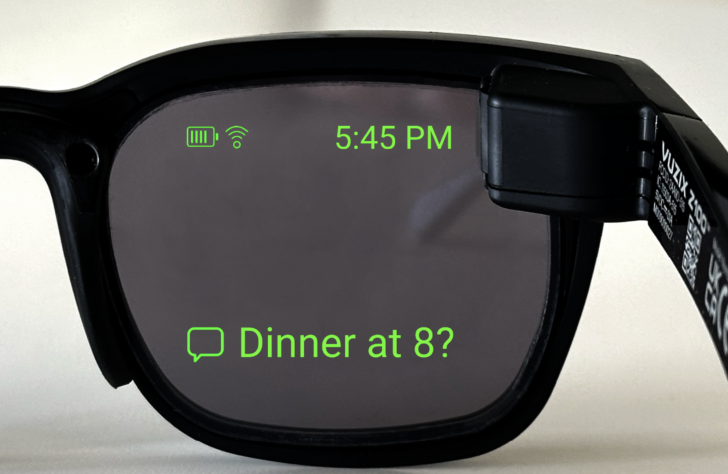Copyright Wccftech

The advent of AI and Meta's launch of its smart glasses have injected fresh air into the sector after Google decided to shelve its smart glasses in 2023, the sector has seen increased interest. In fact, Meta CEO Mark Zuckerberg has gone as far as to suggest that courtesy of AI, users who do not use smart glasses can find themselves at a cognitive disadvantage. To understand the smart glasses industry and how the gadgets can impact consumer electronics manufacturing, semiconductor fabrication and AI GPU production, we decided to talk to Vuzix Corporation's President, Enterprise Solutions Dr. Chris Parkinson. Vuzix manufacturers AI-powered smart glasses for the consumer and enterprise markets. Our discussion with Dr. Parkinson focused on how smart glasses can help semiconductor fabrication and product quality in consumer electronics contract manufacturing. Consumer electronics manufacturing is important to Vuzix, since the firm received an additional $5 million investment from one of Taiwan's largest contract manufacturers, Quanta, last month. As a starting question, can you discuss the overall AI smart glasses market and where Vuzix is currently positioned? I can. But I will give you a quick caveat. I've only been with Vuzix for three weeks, so I'm new to the company. I've come on board to lead the drive into enterprise products and solutions. So it turns out that Vuzix really has two groups within it. One is making the optical components for smart glasses which are called the waveguides, and the other, under my division now is to turn that into product and sell product into the enterprise space. So to give you a crude idea, I've been in this space for last ten years in prior companies so have a bit of knowledge about the space but maybe not the full inner workings of Vuzix yet. But having said that, how do I see the state of the smart glasses industry? I think it's very healthy. I think it's a very exciting place to be in right now. We've been tracking it for years. It's taking a number of breakthroughs, that needed to happen to go where it is today. Two breakthroughs that have interested me. One is the waveguide technology, that's the ability to just take a pair of glasses like the ones you're wearing, and inject an image into them so you can see it on your glasses and not have big bulky headsets around you. That's a huge bit that's gonna make adoption work. But the second bit to this is the AI that's happening, the artificial intelligence because that's allowing you now to speak naturally to these devices and interact in a more natural way. And why is that important? Because without that, user interface was a horrible topic when it comes to smart glasses. How to speak your way through menus and do things there in a completely unnatural way has hindered it. So you might have the coolest, sleekest looking glasses, but if you put them on and it's difficult to use, doesn't help. So those two technologies have come together in the last two years. And we're now seeing that explosion in the number of smart glass companies coming to the table, culminating obviously last week with Meta announcing their glasses. So the industry's very exciting. Where the challenge is that a lot of people are chasing consumer version of this, because they believe it's going to be the smartphone. But the real use cases haven't been defined yet. So technology is leading the use in this case. Which is always a bit tricky. Technology looking for a home. And it hasn't really found a killer app, that's gonna drive everyone away from the smartphone to wanting the consumer glasses. Conversely, if I look at the enterprise space and even the military space there are many clear use cases that have great benefit to wearing smart glasses today. And that's what I'm driving at the moment, because we don't have to try to build something and hope the customer will come. This is building product that takes you out straight to solution. So, it's a very exciting space forward. Consumer is particularly massive but no one's really found a use case yet. Enterprise is big, a lot of use cases. Okay. Following up on the enterprise use cases of the smart glasses, Google's Google Glass was I think one of the first movers into this space. But Google ended up shelving the product. So, what makes you think after such a big tech giant was unable to operate in the industry, that Vuzix and other players will be able to break through? Interesting question. Number one, time. Time is important. Ten years ago when Google Glass was coming out and other products coming out, even Vuzix had products out there, it was so new to the population to be strapping something onto your head and have a computer on your head. So you have this brand new market which you had to break down and sell into. Which was slow. And ten years on, it's become more normal, actually for people to expect and companies are now waiting for smart glasses to come. So you've had this shift in the marketplace and the expectation. Partly it's Google Glass, partly it's HoloLens, partly it's Marvel Films and Hollywood giving you smart glasses everywhere. So you've got this shift of expectation that's happened. Second there's that technology shift that's going on. Google Glass was, it didn't look normal. It was awkward looking for people to wear. And in the consumer space, people are not going to wear stuff on their head unless it looks normal. That's where the smart glasses come in. That technology was then not there. This Waveguide technology to project into a regular lens was not there at Google Glass. Also what wasn't there wasn't the user interface. It's difficult to use it. Swiping and touching and tapping, it doesn't work for most people. So again, it was early, it was good, it's been superseded. But it did set up the use cases and it set up the desire and demand for what's coming. Meta’s CEO Mark Zuckerberg recently commented that in the future users without AI powered smart glasses will be left behind. I guess his comments were more in the sense that the data that the smart glasses will provide the users will end up enhancing their cognition or their intelligence. So, do you agree with his assessment? In the enterprise space, it is fair to say that if you. . .do have this equipment with all the extra cognition, you are now elevated to a higher level of performance than your colleague without it. So you do have in a way, a superpower, that allows you to do work better, more effectively. In the consumer space, I think it's a very broad space to go into. So it's difficult to, I'm not sure I've really been sold on that statement yet at this point. Consumer's very broad. And having the knowledge to go shopping and get to a store quicker and easier I don't know if that's going to be the big win that's going to make me advantageous over my colleagues. But Mark, Meta has publicly announced that they see this as a next generation replacing smartphones. That's an uphill lift, that's not gonna happen overnight. It's going to take a while, but you never know, might get there. Cool. So, in the enterprise context of course, and maybe if you can comment on the consumer context as well, in what ways can AI powered smart glasses enhance and improve their users’ lives? I think in the enterprise market, well the base thing that drives me forward is it gives you hands free computing. That's what I like about enterprise. Enterprise is often about doing work with your hands. And you might have gloves on, you might have tools in your hand, you might be lifting boxes around. And the computing solutions today that you need for your job, often require you to be holding a tablet or a phone. So, it becomes a problem I can't have my hands free whilst carrying compute. That's where the smart glasses come in. Because you can now wear the glasses, all the compute functions can go up to there and be driven by voice. Leaving your hands fully free, which is much better for everyone. It means it's a safe environment to work in. You're more productive, more efficient at what you to. For example if you are a mechanic and you're looking into the engine of your car, and you want to reference some schematics or some wire diagrams, well you have to be looking at your tablet or turning your head away. But here now you've got tools in your hand, you're working on your car, and you're talking to your glasses and you're referencing information. And that's how the AI evolves, the camera is actually looking at what you're doing, telling you it finds in you what you should be doing. So you've got the hands free aspect, and now with the aI coming, you've got a camera that's looking at what you're looking at. And that's giving you real time feedback as well. And that's something you couldn't have had before, even with a handheld. So a lot of fund things are coming to make it safe and more productive. So, specifically for Vuzix, I saw that you have quite a diverse portfolio of products, what competitive advantages do your products have over other competitors? Yeah it comes down to, two major areas of Vuzix. The first is they make the waveguide. They make, I'll hold this up for you to see it, that's the waveguide, that's the lens that goes into your glasses, they make those. They are incredibly difficult to make. That's what Vuzix has been doing for the last 14 years, is perfecting how to, not just make one, two, or three, but how to manufacture in large volume at low cost. That is a competitive advanategae that no one else has. Other companies are showing off really nice looking waveguides, but they're only able to make maybe a fifty to a hundred. They're not able to take that to a mass production facility where they're making millions or billions of these things which is what the world will need when we get there. So that's the big competitive advanatage that Vuzix has. And I think second to that, yeah so it's low cost and then all the connections that come with that, and dealing with, for example, we're dealing with a company called Quanta now, Quanta, one of the world's largest manufacturers of products. They make all the Apple MacBook Pros and all that. So they have invested into Vuzix and they're looking at mass production and volume there. So having that linkage is huge. So I think the competitive advantages on that side, low cost and highly manufacturable waveguides. And then on the enterprise side, we're rolling out products that go out to market and solve needs. And making products. And that's unique, because when I say unique, is that we can build a product from ground up. We can start the waveguide, we can put it into glasses at the right form factor for industry. We can add the software. We can then take it to market. So we have really what you call soup to nuts capability here at the company. Which I don't know any other company that has that capability. So since we're on manufacturing, form factor of smart glasses glasses is a constraint in their construction because you've got to essentially squeeze out all the components in a factor that's even smaller than a smartphone but provide at least some basic technological capability.So, what manufacturing technologies do you believe can help overcome this constraint? That I'm afraid is somewhat out of my domain of expertise. You know we'll leave that to the likes of Quanta, for example. Quanta who are there leading the world in large volume electronics manufacturing to squeeze out every ounce of free air from these glasses. But it's an interesting concept because you've got to bring in power to the glasses. Which we've got as a battery. But if you require the glasses to do too much, then you need a bigger battery. And now the weight goes up. And magically, weight and size are so important in keeping it down low. So there's compromise, and I'm very much of the opinion that the glasses should do the minimum computing possible. And you offload that compute to something else. So maybe a smartphone, so it's paired with a smartphone. Or maybe it's more of a broadly worn computer that does it. So you take the weight from the head, because, if it's heavy people aren't going to wear these things for long either. So, there's some definite challenges in the design, not just for having a display, it's about having all the things around it and keeping it magically lightweight. So delving deeper into the business use cases of Vuzix's glasses, do you think that these glasses will be able to improve the operations of contract manufacturers such as Foxconn or like Quanta with whom Vuzix is working to make its glasses? Yes, we've already seen examples of that. You've got for example contract manufacturers, contract with a body, so maybe if Vuzix says we want to build a new headset for the enterprise, can Quanta build it please? And just having smart glasses on site at Quanta allows them to do walk throughs of the equipment manufacturing side on the plant floor so we can see remotely and ensure quality adherence are being met. This saves us having to fly our team out at Taiwan every month to check these things right. So very simple use cases there. That's the remote side of it, with remote video, then actually, in-situ, you've then got the ability to put the glasses on the workers themselves who are maybe lightly trained and then you can have step by step instructions on the glasses saying, step one do this, step two do this. And it gets them trained to do these repetitive tasks a lot more quickly. So you onboard people when you get them trained very quickly. And then after that you can have the camera up here also guiding and making sure oh you were meant to put that screw into that screw hole, but you didn't. This product is nearly finished but you're missing a screen, for example. The camera can be watching that and observing using AI. And it can guide. So quality can go up. You can just sort bring up the user and say, hey, you can't finish that product, you're missing a screw. So you can do things like that as well. So, it has the ability to affect all aspects of the manufacturing. Since we're on the topic of enterprise use cases, one of the world's leading industries right now is the semiconductor industry. So, what role can Vuzix's smart glasses play in semiconductor fabrication? Again we've got many examples of how we're already using these products in those areas. You've got, again, the daily inspection rounds of the equipment every morning. Recording and auditing, walking around, checking the equipment there, it's working, all the dials are right, all the settings are correct. And having the glasses record that, using AI to identify that everything is in place. That's one of them. You've got the operations, where, especially in these semiconductor industries you've got people in clean rooms with full protective gear on, gloves on, hats. How they operate computers at that point, I don't know. Many computers don't work with touchscreens, if you've got big thick gloves on. So again, hands free glasses. Safety glasses for example that tell you that here's my five steps I've got to go through to get the job done. Like interact with the computer and say yes I'm done step one, I've done step two. Oh, step three, I need help, let me call my line manager from right here. I need my line manager to look at what I'm doing, he can advise me. All of that is just now part and parcel of their daily routine. So there's a lot of opportunity to streamline and make things better for people. We've tried this before with earlier Vuzix products, but typically they're a little bit too clumsy, too heavy. Now, the new set of smart glasses coming, take away that, make this thing easy to wear, given that these people are already wearing safety glasses. They have to put on smart safety glasses on now and have all this capability. Big tech companies, like Apple, who've got their contract manufacturing operations in China and they are very stringent about quality control. Do you believe in the future that Vuzix could land big customers like Apple for its enterprise glasses, or like TSMC, which is the world's biggest contract chip manufacturer, or like NVIDIA, which is the world's biggest AI chip maker whose Blackwell GPUs have thousands of parts which require complex assembly techniques? I certainly hope so. That's why I joined Vuzix. Because I believe in the future of this. It's gonna be very big, the dam is about to break, it's been building and building. And we're definitely gonna get there very shortly. It's about, not just the smart glasses, it's about the whole solution. It's about giving the Foxconns, the Amazons, the Apples, giving them something that just works out of the box. They put glasses on, they can do remote inspections for quality control, they can do step by step guidance. All of that just becomes part and parcel, it can done very quickly and easy with smart glasses from Vuzix. Given that we've discussed the semiconductor fabrication and consumer electronics manufacturing use cases for Vuzix's enterprise smart glasses. Would you agree with the statement that smart glasses are the future when it comes to quality control for consumer electronics manufacturing, AI GPU manufacturing, and semiconductor fabrication? I believe it is a very important part of the all these large scale rollouts right. At these large scale manufacturing sites. The ability just to wear glasses that are so easy to wear. You don't need training, they are giving you the ability to audit factories, audit stations, you can then record for quality control, what's going on. You can then call in remote inspectors if that's needed. It just really improves how easy it is to do quality inspection around site, both locally and remotely. And quite often, at these places you might have one building say half a mile away that's building some components that get shipped in another building. Just having that inter company link, video link is very useful as well. So you don't have to keep walking to the building and back and forth again. You just put on the glasses and have a call with someone. And see what's going on and chat. It just will help streamline all these manufacturing sites around the world. And we definitely hope that we are positioned to take a major part of that business. So in your opinion, smart glasses can be the future of consumer electronic contract manufacturing, semiconductor fabrication, and AI GPU manufacturing? Absolutely, yes, yes.



